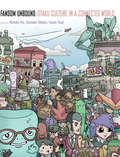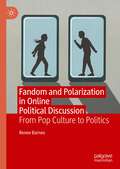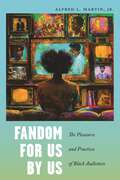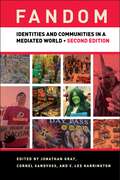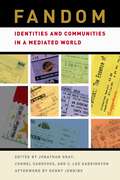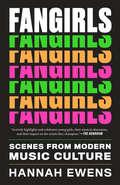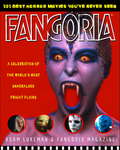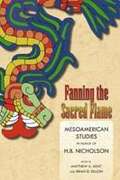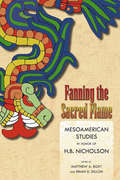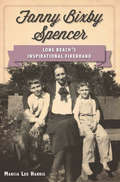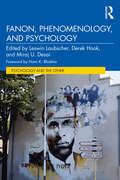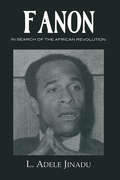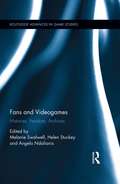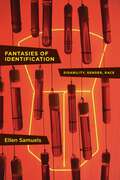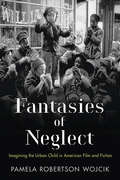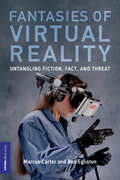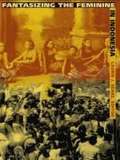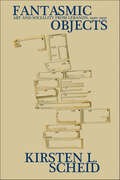- Table View
- List View
Fandom Is Ugly: Networked Harassment in Participatory Culture (Critical Cultural Communication #47)
by Mel StanfillHighlights the importance of considering contemporary public culture through the lens of fan studiesThe Gamergate harassment campaign of women in video games, the “Unite the Right” rally where hundreds of Confederate monument supporters cried out racist and antisemitic slurs in Charlottesville, and the targeted racist and sexist harassment of Star Wars’ Asian American actress Kelly Marie Tran all have one thing in common: they demonstrate the collective power and underlying ugliness of fandoms. These fans might feel victimized or betrayed by the content they’ve intertwined with their own identities, or they may simply feel that they’re speaking truth to power. Regardless, by connecting via social media, they can unleash enormous amounts of hate, which often results in severe real-world consequences.Fandom Is Ugly argues that reactionary politics and media fandoms go hand in hand, and to understand one, we need to understand the other. Mel Stanfill pushes back on two mainstream assumptions: that media and the pleasure of consumption are frivolous and unworthy of study, and that fandoms are inherently progressive. Drawing on a corpus of angry social media posts, Fandom Is Ugly finds that ugly moments happen when deep emotional attachments collide with social structures and situations that have been misunderstood. By holistically examining the forms of ugly fandom in cases that touch upon race, gender, and sexuality, Fandom Is Ugly produces a comprehensive theory of the negative sides of fan attachments.
Fandom Unbound: Otaku Culture in a Connected World
by Mizuko Ito Daisuke Okabe Izumi TsujiIn recent years, otaku culture has emerged as one of Japan’s major cultural exports and as a genuinely transnational phenomenon. This timely volume investigates how this once marginalized popular culture has come to play a major role in Japan’s identity at home and abroad. In the American context, the word otaku is best translated as “geek”—an ardent fan with highly specialized knowledge and interests. But it is associated especially with fans of specific Japan-based cultural genres, including anime, manga, and video games. Most important of all, as this collection shows, is the way otaku culture represents a newly participatory fan culture in which fans not only organize around niche interests but produce and distribute their own media content. In this collection of essays, Japanese and American scholars offer richly detailed descriptions of how this once stigmatized Japanese youth culture created its own alternative markets and cultural products such as fan fiction, comics, costumes, and remixes, becoming a major international force that can challenge the dominance of commercial media. By exploring the rich variety of otaku culture from multiple perspectives, this groundbreaking collection provides fascinating insights into the present and future of cultural production and distribution in the digital age.
Fandom and Polarisation in Online Political Discussion: From Pop Culture to Politics
by Renee BarnesThis book takes an innovative fan studies approach to investigating one of the most pressing issues of contemporary times: polarization. Drawing on three years of observational data from Facebook political discussions, as well as interviews and survey responses from those heavily engaged in online political debate, Barnes argues a fan-like investment in a political perspective initiates and drives polarization. She calls on us to move beyond the traditional Habermasian approach to political discussion, which privileges the rational and deliberative, and instead focus on how we perform the self. How we behave in these online debates is part of a performance, a performance of self, in which an affective investment in a particular political perspective drives a need to contribute, refute and ‘other’ those opposing. Because this performance stems from an emotional basis, judgments and contributions are often not rational or factual, but rather a form of establishing and defending an identity.
Fandom for Us, by Us: The Pleasures and Practices of Black Audiences (Postmillennial Pop)
by Alfred L. Jr.The convergence of the politics of representation and Black fan culturesBoldly going where few fandom scholars have gone before, Fandom for Us, by Us breaks from our focus on white fandom to center Black fandoms. Alfred L. Martin, Jr., engages these fandoms through what he calls the “four C’s”: class, clout, canon, and comfort.Class is a key component of how Black fandom is contingent on distinctions between white, nationally recognized cultural productions and multicultural and/or regional cultural productions, as demonstrated by Misty Copeland’s ascension in American Ballet Theatre. Clout refers to Black fans’ realization of their own consumer spending power as an agent for industrial change, reducing the precarity of Blackness within historically white cultural apparatuses and facilitating the production of Black blockbusters like 2018’s Black Panther. Canon entails a communal fannish practice of sharing media objects, like the 1978 film The Wiz, which lead them to take on meanings outside of their original context. Comfort describes the nostalgic and sentimental affects associated with beloved fan objects such as the television show, Golden Girls, connected to notions of Black joy and signaling moments wherein Black people can just be themselves.Through 75 in-depth interviews with Black fans, Fandom for Us, by Us argues not only for the importance of studying Black fandoms, but also demonstrates their complexities by both coupling and decoupling Black reception practices from the politics of representation. Martin highlights the nuanced ways Black fans interact with media representations, suggesting class, clout, canon, and comfort are universal to the study of all fandoms. Yet, for all the ways these fandoms are similar and reciprocal, Black fandoms are also their own set of practices, demanding their own study.
Fandom, Second Edition: Identities and Communities in a Mediated World
by Jonathan Gray C. Lee Harrington Cornel SandvossA completely updated edition of a seminal work on fans and how fandom shapes the culture, social relations, economic models, and politics of our age. We are all fans. Whether we follow our favorite celebrities on Twitter, attend fan conventions such as Comic Con, or simply wait with bated breath for the next episode of our favorite television drama—each of us is a fan. Recognizing that fandom is not unusual, but rather a universal subculture, the contributions in this book demonstrate that understanding fans—whether of toys, TV shows, celebrities, comics, music, film, or politicians—is vital to an understanding of media audiences, use, engagement, and participatory culture in a digital age. Including eighteen new, original essays covering topics such as activism directed at racism in sports fandom, fan/producer interactions at Comic Con, the impact of new technologies on fandom, and the politics and legality of fanfic, this wide-ranging collection provides diverse approaches to fandom for anyone seeking to understand modern life in our increasingly mediated, globalized and binge-watching world. &“An excellent collection, the second edition of Fandom continues to push the boundaries of fan studies in bold directions. Reflecting the new developments in the field, this lively, engaging, and high-quality volume will be the go-to book for anyone engaged with the future of fan culture.&” —Jason Mittell, Middlebury College&“This new edition of Fandom takes fan studies in exciting new directions, providing a crucial intervention into the way the field is evolving. Thought-provoking and mature, it will change the way we think about the next generation of fan scholarship. A fantastic book.&” —Paul Booth, author of Digital Fandom 2.0 and Playing Fans
Fandom: Identities and Communities in a Mediated World
by Jonathan Gray C. Lee Harrington Cornel SandvossWe are all fans. Whether we log on to Web sites to scrutinize the latest plot turns in Lost, "stalk" our favorite celebrities on Gawker, attend gaming conventions, or simply wait with bated breath for the newest Harry Potter novel--each of us is a fan. Fandom extends beyond television and film to literature, opera, sports, and pop music, and encompasses both high and low culture. Fandom brings together leading scholars to examine fans, their practices, and their favorite texts. This unparalleled selection of original essays examines instances across the spectrum of modern cultural consumption from Karl Marx to Paris Hilton, Buffy the Vampire Slayer to backyard wrestling, Bach fugues to Bollywood cinema¸ and nineteenth-century concert halls to computer gaming. Contributors examine fans of high cultural texts and genres, the spaces of fandom, fandom around the globe, the impact of new technologies on fandom, and the legal and historical contexts of fan activity. Fandom is key to understanding modern life in our increasingly mediated and globalized world.
Fangirls: Scenes from Modern Music Culture (American Music Series)
by Hannah EwensOne of Pitchfork&’s 15 Favorite Music Books of 2020: &“An entertaining, in-depth examination of fan subcultures.&” ―The A.V. Club &“To be a fan is to scream alone together&”—this is the discovery Hannah Ewens makes in Fangirls: how music fandom is at once a journey of self-definition and a conduit for connection and camaraderie; how it is both complicated and empowering; and how now, more than ever, fandoms composed of girls and young queer people create cultures that shape and change an entire industry. Speaking to hundreds of fans from the UK, US, Europe, and Japan, Ewens tells the story of music fandom using its own voices, recounting previously untold or glossed-over scenes from modern pop and rock music history. In doing so, she uncovers the importance of fan devotion: how Ariana Grande represents both tragedy and resilience to her followers, or what it means to meet an artist like Lady Gaga in person. From One Directioners to members of the Beyhive to the author&’s own fandom experiences, this book reclaims the &“fangirl&” label for its young members, celebrating their purpose, their power, and, most of all, their passion for the music they love. &“Excellent.&” —The Independent
Fangirls: Scenes from Modern Music Culture (American Music Series)
by Hannah EwensOne of Pitchfork&’s 15 Favorite Music Books of 2020: &“An entertaining, in-depth examination of fan subcultures.&” ―The A.V. Club &“To be a fan is to scream alone together&”—this is the discovery Hannah Ewens makes in Fangirls: how music fandom is at once a journey of self-definition and a conduit for connection and camaraderie; how it is both complicated and empowering; and how now, more than ever, fandoms composed of girls and young queer people create cultures that shape and change an entire industry. Speaking to hundreds of fans from the UK, US, Europe, and Japan, Ewens tells the story of music fandom using its own voices, recounting previously untold or glossed-over scenes from modern pop and rock music history. In doing so, she uncovers the importance of fan devotion: how Ariana Grande represents both tragedy and resilience to her followers, or what it means to meet an artist like Lady Gaga in person. From One Directioners to members of the Beyhive to the author&’s own fandom experiences, this book reclaims the &“fangirl&” label for its young members, celebrating their purpose, their power, and, most of all, their passion for the music they love. &“Excellent.&” —The Independent
Fangoria's 101 Best Horror Movies You've Never Seen
by Adam LukemanA FEAST OF FRIGHTFUL FLICKS WAITING TO BE REDISCOVEREDAs the leading name in the world of horror, Fangoria magazine has been the source of information for fans of fright flicks for more than twenty years--covering feature films, video games, comic books, collectibles, and all aspects of horror entertainment. Working closely with Fangoria's experts, including Editor in Chief Anthony Timpone, Adam Lukeman has compiled a must-have guide for casual horror fans and hardcore horror junkies with Fangoria's 101 Best Horror Films You've Never Seen. With a brief synopsis for each of the included films, lists of cast and crew, "Terror Trivia," and little-known facts about these lesser-known but must-see gems, Fangoria's 101 Best Horror Films You've Never Seen offers a feast of gruesome information. Featured here are flicks that were dumped by their distributors or were initially flops, like Cherry Falls, Manhunter, and Pumpkinhead, foreign winners such as Cronos, The Vanishing, and Funny Games, and straight-to-video sleepers waiting to be discovered, including Shadowbuilder, Jack Be Nimble, and Nomads. There are even surprise entries directed by industry giants--movies like George A. Romero's Day of the Dead, Brian De Palma's Sisters, or Dario Argento's Opera--that are frequently overshadowed by the filmmakers' other, better-known works but are worthy of further examination. Entertaining and informative, Fangoria's 101 Best Horror Movies You've Never Seen offers more than a hundred reasons to look beyond the often ho-hum Hollywood hype fests . . . when you're really in the mood to feel your flesh crawl.From the Trade Paperback edition.
Fannie Barrier Williams: Crossing the Borders of Region and Race
by Wanda A. HendricksBorn shortly before the Civil War, activist and reformer Fannie Barrier Williams (1855-1944) became one of the most prominent educated African American women of her generation. Hendricks shows how Williams became "raced" for the first time in early adulthood, when she became a teacher in Missouri and Washington, D.C., and faced the injustices of racism and the stark contrast between the lives of freed slaves and her own privileged upbringing in a western New York village. She carried this new awareness to Chicago, where she joined forces with black and predominantly white women's clubs, the Unitarian church, and various other interracial social justice organizations to become a prominent spokesperson for Progressive economic, racial, and gender reforms during the transformative period of industrialization. By highlighting how Williams experienced a set of freedoms in the North that were not imaginable in the South, this clearly-written, widely accessible biography expands how we understand intellectual possibilities, economic success, and social mobility in post-Reconstruction America.
Fanning the Sacred Flame
by Matthew A. Boxt Brian D. DillonFanning the Sacred Flame: Mesoamerican Studies in Honor of H. B. Nicholson contains twenty-two original papers in tribute to H. B. "Nick" Nicholson, a pioneer of Mesoamerican research. His intellectual legacy is recognized by Mesoamerican archaeologists, art historians, ethnohistorians, and ethnographers--students, colleagues, and friends who derived inspiration and encouragement from him throughout their own careers. Each chapter, which presents original research inspired by Nicholson, pays tribute to the teacher, writer, lecturer, friend, and mentor who became a legend within his own lifetime. Covering all of Mesoamerica across all time periods, contributors include Patricia R. Anawalt, Alfredo López Austin, Anthony Aveni, Robert M. Carmack, David C. Grove, Richard D. Hansen, Leonardo López Luján, Kevin Terraciano, and more. Eloise Quiñones Keber provides a thorough biographical sketch, detailing Nicholson's academic and professional journey.
Fanning the Sacred Flame: Mesoamerican Studies in Honor of H. B. Nicholson (Mesoamerican Worlds)
by Matthew A. Boxt Brian Dervin DillonFanning the Sacred Flame: Mesoamerican Studies in Honor of H. B. Nicholson contains twenty-two original papers in tribute to H. B. "Nick" Nicholson, a pioneer of Mesoamerican research. His intellectual legacy is recognized by Mesoamerican archaeologists, art historians, ethnohistorians, and ethnographers--students, colleagues, and friends who derived inspiration and encouragement from him throughout their own careers. Each chapter, which presents original research inspired by Nicholson, pays tribute to the teacher, writer, lecturer, friend, and mentor who became a legend within his own lifetime. Covering all of Mesoamerica across all time periods, contributors include Patricia R. Anawalt, Alfredo López Austin, Anthony Aveni, Robert M. Carmack, David C. Grove, Richard D. Hansen, Leonardo López Luján, Kevin Terraciano, and more. Eloise Quiñones Keber provides a thorough biographical sketch, detailing Nicholson's academic and professional journey. Publication supported, in part, by The Patterson Foundation and several private donors.
Fanny Bixby Spencer: Long Beach's Inspirational Firebrand
by Marcia Lee HarrisThe last daughter born to Jotham Bixby, the "Father of Long Beach," Fanny Bixby Spencer (1879-1930) carved her own singular and eccentric path across California history. Born to wealth and power, she chose a boldly independent, egalitarian lifestyle in an age when women's lives were largely confined to domesticity. Fanny served with the Long Beach Police Department as America's first policewoman. She was a founder of the city of Costa Mesa in Orange County. Her humanitarian efforts reached across ethnicities and social standing. Yet beyond her civic accomplishments, Fanny was provocative as a poet, artist, pacifist, suffragist, child advocate, foster mother and humanitarian. Marcia Lee Harris captures this fascinating woman's remarkable life, enhanced by Fanny's own poetry and soulful reflections.
Fanon, Phenomenology, and Psychology (Psychology and the Other)
by Leswin Laubscher, Derek Hook, and Miraj U. DesaiFanon, Phenomenology, and Psychology is the first edited collection dedicated to exploring the explicitly phenomenological foundations underlying Frantz Fanon’s most important insights. Featuring contributions from many of the world’s leading scholars on Fanon, this volume foregrounds a series of crucial phenomenological topics – inclusive of the domains of experience, structure, embodiment, and temporality – pertaining to the analysis and interrogation of racism and anti-Blackness. Chapters highlight and expand Fanon’s ongoing importance to the discipline of psychology while opening compelling new perspectives on psychopathology, decolonial praxis, racialized time, whiteness, Black subjectivity, the "racial ontologizing of the body," systematic structures of racism and resulting forms of trauma, Black Consciousness, and Africana phenomenology. In an era characterized by resurgent forms of anti-Blackness and racism, this book is essential reading for students, scholars, and activists who remain inspired by Fanon’s legacy.
Fanon: In Search of the African Revolution
by L. Adele JinaduFirst published in 1986. Fanon: In Search of the African Revolution is different from other books on Fanon in that it approaches him as both a political philosopher and political sociologist of the African experience. It suggests that Fanon's political writings be viewed in terms of his concern with how relations are structured in colonial and post-colonial Africa and the implications of those structural arrangements for political conflict in Africa. Fanon's attempt to explain the pathologies and contradictions of African politics in terms of class and the historical processes that influence and constrain class political behavior is provocative and insightful. But the moral dimension that informs Fanon's theoretical perspectives is no less important, if only because it attests to his strong advocacy of the need for revolutionary change as a condition for the restructuring of African political systems.
Fanpire: The Twilight Saga and the Women Who Love it
by Tanya ErzenAn author immerses herself in the frenzied fandom of Twilight, the young-adult vampire romance series that has captivated women of all ages Twilight, Stephenie Meyer's young-adult vampire romance series, has captivated women of all ages, from teenagers who swoon over the film adaptations to college-educated women who devour the novels as a guilty pleasure. All told, over 110 million copies of the books have been sold worldwide, with translations into 37 languages, and the movies are some of the highest-grossing of all time. Twilight is a bona fide cultural phenomenon that has inspired a vast and unimaginably fertile fan subculture--the "fanpire," as the members describe it. Just what is it about Twilight that has enchanted so many women? Tanya Erzen--herself no stranger to the allure of the series--sets out to explore the irresistible pull of Twilight by immersing herself in the vibrant and diverse world of "Twi-hards," from Edward-addition groups and "Twi-rock" music to Cullenism, a religion based on the values of Edward's family of vegetarian vampires. Erzen interviews hundreds of fans online and in person, attends thousand-strong conventions, and watches the film premiere of New Moon with Twilight moms in Utah. Along the way, she joins a tour bus on a pilgrimage to Twilight-inspired sites, struggles through a Bella self-defense class, and surveys the sub-universe of Twilight fan-fiction (including E. L. James's enormously popular "Master of the Universe" story, the basis for her erotic novel Fifty Shades of Grey). Erzen also takes a deeper look at the appeal of traditional gender roles in a postfeminist era saturated with narratives of girl power. If Twilight's fantasies of romance and power reflect the fears, insecurities, and longings of the women who love it, the fanpire itself, Erzen shows, offers a space for meaningful bonding, mutual understanding, and friendship. Part journalistic investigation and part cultural analysis, Fanpire will appeal to obsessed fans, Twilight haters, and bemused onlookers alike.From the Hardcover edition.
Fans and Videogames: Histories, Fandom, Archives (Routledge Advances in Game Studies)
by Melanie Swalwell Angela Ndalianis Helen StuckeyThis anthology addresses videogames long history of fandom, and fans’ important role in game history and preservation. In order to better understand and theorize video games and game playing, it is necessary to study the activities of gamers themselves. Gamers are active creators in generating meaning; they are creators of media texts they share with other fans (mods, walkthroughs, machinima, etc); and they have played a central role in curating and preserving games through activities such as their collective work on: emulation, creating online archives and the forensic archaeology of code. This volume brings together essays that explore game fandom from diverse perspectives that examine the complex processes at work in the phenomenon of game fandom and its practices. Contributors aim to historicize game fandom, recognize fan contributions to game history, and critically assess the role of fans in ensuring that game culture endures through the development of archives.
Fanshan Royal Cemetery: Pyramid of the East (Liangzhu Civilization)
by Xiangming FangThis book outlines the latest research in Fanshan by the archaeologist, a man-made hathpace cemetery, on which is located the inner city of Liangzhu historical site at northwest area. There are 11 tomb locations discovered in Fanshan as built based on mutual dependency while and after excavation and were found continuously more than 1200 pieces (assemblages) of burial accessories, while at least 1100 pieces of jades were among the unearthed items. In view of the above-mentioned background, Fanshan as royal cemetery is well known for the largest number and variety of exquisite highly polished jades. In addition to prehistoric art, the work also explores the traces of Fanshan royal cemetery in conjunction with a substantial number of photos taken by expert of the historical site, restores the crucial burial objects and funeral rite as well as interprets burial accessories in different ways to discover the identity of the tomb’s occupants such as social class and status and moreover the interlocking system of an organization.
Fantasies of Hong Kong Disneyland: Attempted Indigenizations of Space, Labor, and Consumption
by Jenny BanhFantasies of Hong Kong Disneyland: Attempted Indigenizations of Space, Labor, and Consumption examines the attempt to transplant Disney's "happiest place on Earth" ethos to Hong Kong—with unhappy results. Focusing on the attempted localization/indigenization of this idea in a globalized transnational park, the book delves into the three-way dynamics of an American culture-corporation's intentions, Hong Kong, China's government investment and Hong Konger audience, and the Hong Kong Chinese locale. The triple actors introduce an especially complex case as two of the world's most powerful entities, the nominally Communist state of China and corporate behemoth Disney, come together for a project in the third space of Hong Kong. The situation poses special challenges for Disney's efforts to manage space, labor, and consumption to achieve local adaptation and business success.
Fantasies of Identification: Disability, Gender, Race (Cultural Front #10)
by Ellen SamuelsExplores the roots of modern understandings of bodily identityIn the mid-nineteenth-century United States, as it became increasingly difficult to distinguish between bodies understood as black, white, or Indian; able-bodied or disabled; and male or female, intense efforts emerged to define these identities as biologically distinct and scientifically verifiable in a literally marked body. Combining literary analysis, legal history, and visual culture, Ellen Samuels traces the evolution of the “fantasy of identification”—the powerful belief that embodied social identities are fixed, verifiable, and visible through modern science. From birthmarks and fingerprints to blood quantum and DNA, she examines how this fantasy has circulated between cultural representations, law, science, and policy to become one of the most powerfully institutionalized ideologies of modern society.Yet, as Samuels demonstrates, in every case, the fantasy distorts its claimed scientific basis, substituting subjective language for claimed objective fact. From its early emergence in discourses about disability fakery and fugitive slaves in the nineteenth century to its most recent manifestation in the question of sex testing at the 2012 Olympic Games, Fantasies of Identification explores the roots of modern understandings of bodily identity.
Fantasies of Neglect: Imagining the Urban Child in American Film and Fiction
by Pamela Robertson WojcikIn our current era of helicopter parenting and stranger danger, an unaccompanied child wandering through the city might commonly be viewed as a victim of abuse and neglect. However, from the early twentieth century to the present day, countless books and films have portrayed the solitary exploration of urban spaces as a source of empowerment and delight for children. Fantasies of Neglect explains how this trope of the self-sufficient, mobile urban child originated and considers why it persists, even as it goes against the grain of social reality. Drawing from a wide range of films, children's books, adult novels, and sociological texts, Pamela Robertson Wojcik investigates how cities have simultaneously been demonized as dangerous spaces unfit for children and romanticized as wondrous playgrounds that foster a kid's independence and imagination. Charting the development of free-range urban child characters from Little Orphan Annie to Harriet the Spy to Hugo Cabret, and from Shirley Temple to the Dead End Kids, she considers the ongoing dialogue between these fictional representations and shifting discourses on the freedom and neglect of children. While tracking the general concerns Americans have expressed regarding the abstract figure of the child, the book also examines the varied attitudes toward specific types of urban children--girls and boys, blacks and whites, rich kids and poor ones, loners and neighborhood gangs. Through this diverse selection of sources, Fantasies of Neglect presents a nuanced chronicle of how notions of American urbanism and American childhood have grown up together.
Fantasies of Virtual Reality: Untangling Fiction, Fact, and Threat (Strong Ideas)
by Marcus Carter Ben EglistonThe fantasies that underpin common perceptions of Virtual Reality—and what we need to know about VR&’s potential risks as well as its opportunities.Virtual reality is the next new frontier for Silicon Valley. Mark Zuckerberg, who has overseen Meta&’s investment of billions into VR, pitches it as the next dominant computing paradigm. More than just a gaming technology, VR is top of mind for academics, tech reportage, and industry evangelists who all see the potential for VR to revolutionize fields such as education and health, as well as the way we work and communicate. But will VR achieve all this? In Fantasies of Virtual Reality, Marcus Carter and Ben Egliston strip bare the tech industry&’s vision of a future dominated by immersive VR experiences, challenging the utopian promises of this technology&’s potential.Carter and Egliston offer a critical account of VR in a variety of contexts, from gaming to human resources to policing and the military. They argue that while VR does hold significant potential, the overhyped expectations surrounding it, from achieving true empathetic understanding to transforming traditional education and office work, are often overstated and fraught with issues of privacy, control, and exclusion. What&’s more, there is nothing truly virtual about virtual reality: VR is deeply entrenched in the material world, driven by tangible technological, economic, and social logics.An accessible introduction to this emerging technology, Fantasies of Virtual Reality is essential reading for anyone interested in what VR can really do—and what is just plain fantasy.
Fantasies of the Master Race: Literature, Cinema and the Colonization of American Indians
by Ward Churchill M. Annette JaimesIn this volume of incisive essays, Ward Churchill looks at representations of American Indians in literature and film, delineating a history of cultural propaganda that has served to support the continued colonization of Native America. During each phase of the genocide of American Indians, the media has played a critical role in creating easily digestible stereotypes of Indians for popular consumption. Literature about Indians was first written and published in order to provoke and sanctify warfare against them. Later, the focus changed to enlisting public support for "civilizing the savages," stripping them of their culture and assimilating them into the dominant society. Now, in the final stages of cultural genocide, it is the appropriation and stereotyping of Native culture that establishes control over knowledge and truth.
Fantasizing the Feminine in Indonesia
by Laurie J. SearsThe stories of Indonesian women have often been told by Indonesian men and Dutch men and women. This volume asks how these representations--reproduced, transformed, and circulated in history, ethnography, and literature--have circumscribed feminine behavior in colonial and postcolonial Indonesia. Presenting dialogues between prominent scholars of and from Indonesia and Indonesian women working in professional, activist, religious, and literary domains, the book dissolves essentialist notions of "women" and "Indonesia" that have arisen out of the tensions of empire.The contributors examine the ways in which Indonesian women and men are enmeshed in networks of power and then pursue the stories of those who, sometimes at great political risk, challenge these powers. In this juxtaposition of voices and stories, we see how indigenous patriarchal fantasies of feminine behavior merged with Dutch colonial notions of proper wives and mothers to produce the Indonesian government's present approach to controlling the images and actions of women. Facing the theoretical challenge of building a truly cross-cultural feminist analysis, Fantasizing the Feminine takes us into an ongoing conversation that reveals the contradictions of postcolonial positionings and the fragility of postmodern identities. This book will be welcomed by readers with interests in contemporary Indonesian politics and society as well as historians, anthropologists, and other scholars concerned with literature, gender, and cultural studies.Contributors. Benedict R. O'G. Anderson, Sita Aripurnami, Jane Monnig Atkinson, Nancy K. Florida, Daniel S. Lev, Dédé Oetomo, Laurie J. Sears, Ann Laura Stoler, Saraswati Sunindyo, Julia I. Suryakusuma, Jean Gelman Taylor, Sylvia Tiwon, Anna Lowenhaupt Tsing, Diane L. Wolf
Fantasmic Objects: Art and Sociality from Lebanon, 1920–1950 (Public Cultures Of The Middle East And North Africa Ser.)
by Kirsten L. ScheidIn Lebanon, the study of modern art—rather than power or hierarchy—has compelled citizens to confront how they define themselves as a postcolonial nation.In Fantasmic Objects, Kirsten L. Scheid offers a striking study of both modern art in Lebanon and modern Lebanon through art. By focusing on the careers of Moustapha Farrouk and Omar Onsi, forefathers of an iconic national repertoire, and their rebellious student Saloua Raouda Choucair, founder of an antirepresentational, participatory art, Scheid traces an emerging sense of what it means to be Lebanese through the evolution of new exhibition, pedagogical, and art-writing practices. She reveals that art and artists helped found the nation during French occupation, as the formal qualities and international exhibitions of nudes and landscapes in the 1930s crystallized notions of modern masculinity, patriotic femininity, non-sectarian religiosity, and citizenship. Examining the efforts of painters, sculptors, and activists in Lebanon who fiercely upheld aesthetic development and battled for new forms of political being, Fantasmic Objects offers an insightful approach to the history and formation of modern Lebanon.

